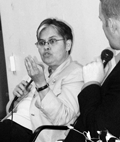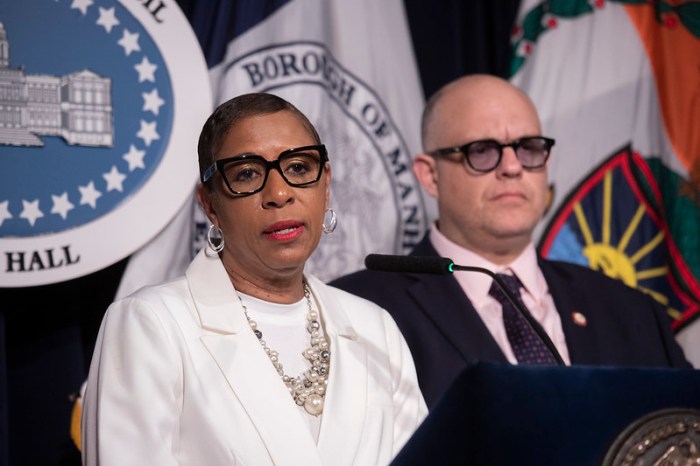Community Center, NY Theatre Workshop team up for discussions of our varied lives
On Tuesday April 12, the Lesbian, Gay, Bisexual & Transgender (LGBT) Community Center teamed up with the New York Theatre Workshop to present “Our Front Porch: Family Portraits from Queer America.”
The event marked the launch of a new Center series, and the first-ever collaboration between the Center and the Theatre Workshop, founded in 1979 to provide quality theatrical and creative opportunities for the queer community and, according to its mission statement, to “explore perspectives on our collective history.”
Judging from the standing-room-only turnout and the lively audience response, the question of family is a hot topic in the queer community.
In 2005, family stories for gay people can run the gamut from “My parents disowned me when I came out” to “My sister caught the bouquet at my wedding.” As gay issues continue to be raised in the media and the courts, many families are learning to cope more gracefully with the reality that “they” are not necessarily “out there somewhere.” They may be seated at the family Thanksgiving table, in a pew at a family christening, at a nephew’s Little League game.
Of course, for many families, homophobia in both its crudest and most refined forms continues to flourish unchecked. But as the gay community evolves, new issues arise and new interpretations of family, both biological and emotional, are born.
The three speakers chosen for the “Our Front Porch” series kickoff are well-known in the community. Terry Boggis, who heads the Center’s Kids’ program, New York City Councilwoman Margarita Lopez, and playwright and screenwriter Paul Rudnick represent markedly different aspects of modern queer society and each had markedly different stories to tell about coming out, being out, and what it means to define, create, preserve and honor family. Their stories ranged from wildly humorous to quirky to heartrending.
The starkest example of this was an account Lopez gave of coming out at the age of 19 to her parents. She was still living in her native Puerto Rico at the time, and was attending college.
“[My parents] said, ‘If you don’t want to live under our rules in this house, then you should go.’ They didn’t think I’d go,” she recalled. But she did. She slept at the airport, and subsisted on scraps left on the tables of the Student Center at the university, where she worked. After three months, during which she managed to continue attending classes, “I met someone who helped me and gave me shelter,” she said.
Lopez and her parents didn’t speak for the next ten years.
“Then they gave in,” she said, and today the family is in frequent contact.
Proving that fact is stranger than fiction, she is now in the unique position of belonging to a family that boasts 29 other gay people in it, both male and female.
“I want to be very clear. Puerto Ricans are not more bigoted than anyone else,” she said.
In contrast to Lopez, Rudnick’s coming out experience was almost buoyant. A native of New Jersey, he recalls that at the age of 11, a family friend came out and was greeted with tolerance by his parents, if not total comprehension. “My mother could understand [her friend] being a lesbian, but couldn’t understand why she didn’t also marry a rich man,” he quipped.
Some ten years later, when Rudnick himself came out, he didn’t have to cope with the homophobia that, even today, is still the rule rather than the exception in families of origin.
“My parents were always overwhelmingly gay positive,” he said.
Perhaps for this reason, Rudnick—author of The Most Fabulous Story Ever Told” and the Obie Award-winning “Jeffrey,” among many works—explained, “I never wanted to write anything that presented being gay as an obstacle.”
Instead, he wanted to “write plays in which a gay sensibility infused the piece” but weren’t about being gay.
While Lopez and Rudnick are both in long-term partnerships—she for 20 years, he for 12—the evening’s other featured speaker, Terry Boggis, is single. Unlike them also, she is a parent. The varied experience of family that this three-speaker panel is indicative of all that’s changing in our community. These days, asking a gay or lesbian person, “Who is your family?” as facilitator Christopher Murray, of the LGBT Community Center, did of all three speakers—can evoke a very wide range of answers.
“John and I aren’t married,” Rudnick said. “We believe everyone should have the right to get married, but we would never do it.
“As a matter of fact,” he added, “we don’t even live together.”
Asked whether he had ever considered fatherhood, he gulped, “Um—in a positive sense?”
“My lover and I were going to have two children,” Boggis said. “That was the plan. The plan was not for her to get cancer. The plan was not for us to stop at one child.”
But after the birth of their son, Boggis’ partner did get cancer, and ultimately died.
“We didn’t expect it to be an only child and a single parent,” she said, characterizing her relationship with her now-teenaged son as “very intense.”
Boggis continued, “We really do have unusual families. When we talk about alternative families, we really mean alternative… Tolerance is not a theory for us.”
Case in point: a gay couple and a lesbian couple of Rudnick’s acquaintance, decided to jointly bear a child biologically, but not long after the baby was born, both couples split up, and all four found new lovers.
“All of them wanted to have a role in the baby’s life. So this little girl has like 28 parents,” he joked.
Lopez offered a different perspective.
“I consider my family to be the people who live in my building.”
Hers are an unusual set of neighbors; in 1979, Lopez founded a collective of Puerto Rican lesbians in a Lower East Side neighborhood that is now, thanks in part to their efforts, politically progressive and free of drug traffic.
Not a typical definition of family, indeed.
“When you talk about issues for our families, you’re talking about welfare issues, citizenship issues, poverty issues, divorce between lesbians, between gay men,” Boggis said. “You’re talking about partnership and co-habitation rights. You’re talking about insemination and custody arrangements, and visitation in the event of illness. There are so many issues we deal with that for straight people are not even examined.”
And the issues for transgendered people, she said, are that much more complicated.
“What they often go through makes gay and lesbian life look like a walk on the beach,” she said.
But Boggis’ outlook is upbeat in the broadest sense: “Eventually justice comes our way… Recognition and tolerance will arrive at some point.”
For now, she urges preparedness.
“I can’t recommend legal contracts for [insemination] donors too strongly,” Boggis said. “They aren’t legal documents but in New York they’re taken into account, at least…If Terry Schiavo had had a female partner, how much say would that partner have had in her death?”
The LGBT Community Center and the New York Theatre Workshop will offer “Our Front Porch: Family Portraits in Gay America” forums in the future.
gaycitynews.com




































